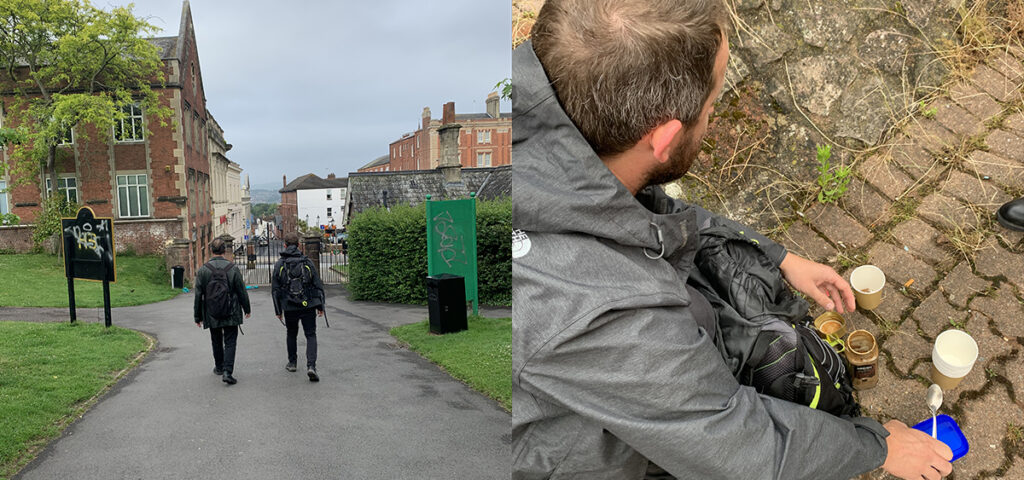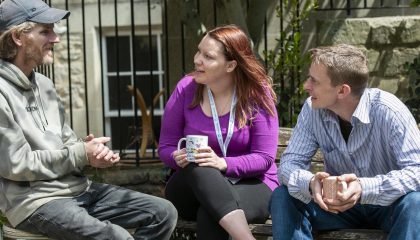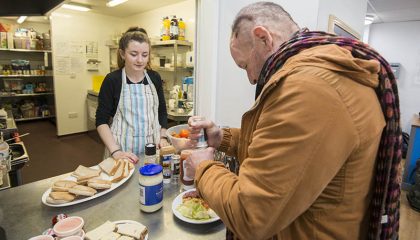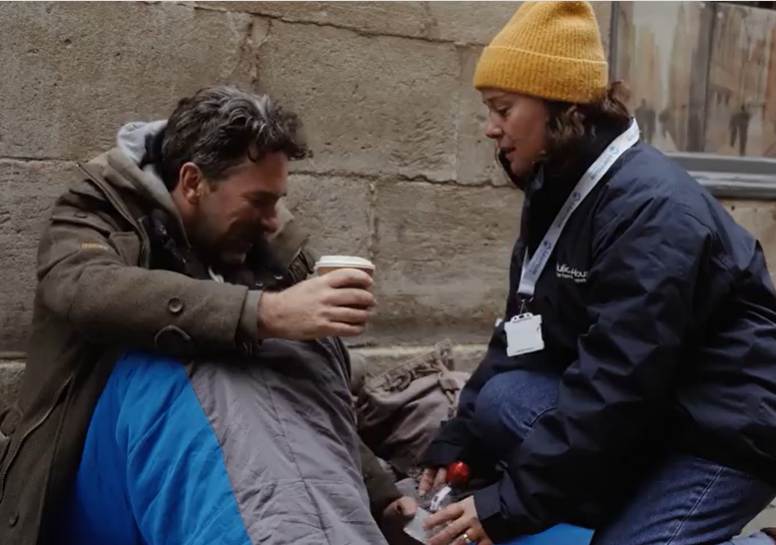
We have lots of outreach teams working across the South West helping people who are out on the streets on a regular basis, ensuring anyone who has been forced to sleep rough, or is leading a street-based lifestyle, understands the options available to support them.
We had a chat with our Outreach Team Leader in Exeter, James Ellison, to find out a bit more about how the service operates and the sort of people it provides vital support for:
What sort of advice/support are you offering to people you see in your outreach sessions?
On outreach, there is a lot of advice and support we can offer. As well as just ‘checking in’ with the people that we meet rough sleeping, we also spend time talking about their access to healthcare, benefits, and housing. When we meet new rough sleepers, we give them information about the resources available to the homeless community in Exeter and encourage them to come to the office and speak to us after they have woken up a bit.
Our aim is to get alongside people and help them into a pathway towards housing that meets their needs. It can take years to get people what they need and sometimes finding stable accommodation can be extremely challenging, but it is our job to stick with them until they have a housing solution.
How many people do you see a day?
 It is difficult to say how many people we see each day, it varies dramatically. Some mornings there are lots of people out but at other times we hardly see anyone. Sometimes people are waiting to speak to us and receive support, at other times we trek into the woods to find someone who is not engaging.
It is difficult to say how many people we see each day, it varies dramatically. Some mornings there are lots of people out but at other times we hardly see anyone. Sometimes people are waiting to speak to us and receive support, at other times we trek into the woods to find someone who is not engaging.
From week to week and at different times of the year, the number of people rough sleeping in Exeter changes a lot. For example, when there is an active Severe Weather Emergency Protocol there should be nobody sleeping on the streets and everyone should be in emergency accommodation. There are always people who refuse the offer of emergency accommodation and that is when going to do an outreach welfare check on them becomes even more important.
Do you often see the same people staying/returning to the streets?
We work a lot with the same people, particularly individuals who return to rough sleeping after a period in supported accommodation. When you have referred someone into an accommodation project and they are evicted after a short period off the streets, it can be disheartening. However, we support some complicated individuals who struggle with the basic life skills that most people have no trouble with. It is important to remember that there is always another housing opportunity for someone, if they work with us, we can find them some accommodation.
There are also a lot of people who are incarcerated and released with no fixed abode, which means they go from the streets to prison and then back to the streets. As well, there is a small number who have become embedded rough sleepers, these are people who refuse any accommodation offer and are resigned to a life without a home. We encourage them as much as we can, but it is difficult because they can be resistant to engaging with support services and we do not want to endanger our relationship with them.
What’s the next step for clients after you have made contact with them?
After we have made contact with a client, the next step is often putting them in contact with other support services and Exeter City Council. We work closely with Exeter City Council and the other organisations offering support to rough sleepers, and it is important that people receive as much support as possible while they are homeless. Once we have verified someone as rough sleeping, then we start helping them to apply for supported accommodation, searching for private rented accommodation, or offering reconnection if they are from outside the area.
Pathways into housing can be quick, a matter of days, or take much longer. When there are issues around local connection, but someone does not want to leave the area, then we end up supporting them for months before they find somewhere to live. We also do a bit of enabling because the private rented sector can be hard to navigate. There is a shortage of affordable housing in Exeter and supported accommodation projects are often full, so we reassure people that it is just a matter of time before they will find somewhere safe to live.
What’s the hardest part of working for outreach?
It is not easy to say what the hardest part of working as a homeless outreach worker is. Delivering bad news can be hard, for example when someone’s application for housing is rejected. Housing is so fundamental to somebody’s wellbeing that when people lose their accommodation, it can feel like the world is against them, and we have support them through that and back into housing. There are strong emotions and sometimes anger, which combined with drug and alcohol use, mean that there is often a lot to process.
Rough sleepers are also more likely to be the victims of violence and have a much lower life expectancy than people who are housed. The animosity and lack of understanding that some members of the public show to the homeless community can be hard, but luckily there are some amazing individuals in the world who contrast this with their generosity and altruism.
You can find out more about our outreach services here.
And if you would like to support the work we do, please consider making a donation here.






